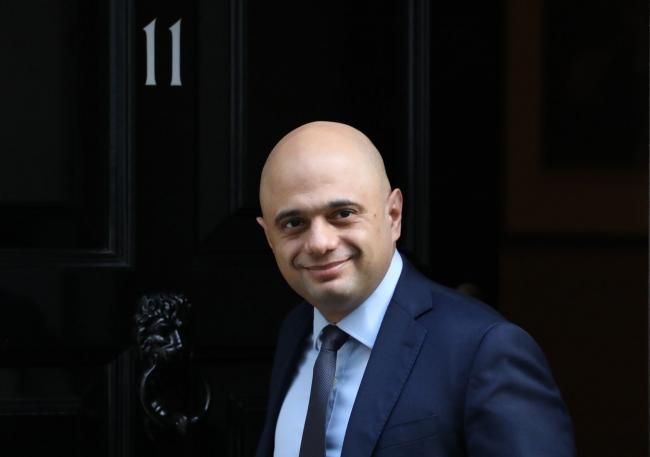
(Bloomberg) — The U.K.’s economic policy was thrown into disarray after Sajid Javid dramatically quit as Chancellor of the Exchequer following a row with Prime Minister Boris Johnson.
Johnson’s office could not confirm that the budget will go ahead as planned on March 11, or that the government will keep to fiscal rules — announced by Javid — which require day-to-day public spending and revenue to be in balance within three years.
Though Johnson’s office moved swiftly to appoint Javid’s deputy, Rishi Sunak, as the new chancellor, the sudden shift in personnel risks throwing Britain’s preparations for life outside the European Union into chaos. Next month’s budget was planned to show a key part of Johnson’s vision for the country outside the world’s largest trading bloc.
Javid resigned after a face-to-face argument with Johnson inside his 10 Downing Street office. The prime minister demanded that Javid fire all five of his most senior aides and set up a new joint economic unit with Johnson’s office. The chancellor refused and quit, pushing the prime minister’s Cabinet reshuffle into chaos.
“I don’t believe any self-respecting minister would accept such conditions and so therefore I felt the best thing to do was to go,” Javid later told the BBC. “The conditions that were attached were a requirement to replace all my political advisers. These are people who had worked incredibly hard on behalf of not just the government but the whole country.”
Javid, who had served as Britain’s finance minister since July 2019, had been locked in a power battle with Johnson’s top adviser Dominic Cummings for months over control of the Treasury.
Earlier Spat
Last year, a furious Javid confronted Johnson and Cummings over the dismissal of Sonia Khan, his media adviser. Cummings had fired her on Aug. 29 after accusing her of lying about being in contact with former colleagues close to Javid’s predecessor, Philip Hammond, who was committed to preventing a no-deal Brexit.
Javid’s resignation letter to Johnson contained a parting shot in the dispute, emphasizing that it is important to “have people around you who can give you clear and candid advice” and warning the prime minister not to allow the Treasury’s reputation to be damaged.
“I would urge you to ensure the Treasury as an institution retains as much credibility as possible,” he wrote. “They are among the very best public servants we have and I hope they can continue to play a central role in driving an economic agenda that puts people and place at its heart.”
Sunak has agreed to work with the prime minister’s office to set up the joint economic unit rejected by Javid, with appointments expected over the coming days, a government official said. The unit will feed into the budget process.
One of five sons of Pakistani immigrants, Javid worked in business and finance before joining Parliament in 2010, with roles at Chase Manhattan Bank and Deutsche Bank (DE:). A major figure in the Tory party, he has held various Cabinet posts, including the culture, business and housing portfolios.
Brief Tenure
His departure is the most dramatic of any chancellor since Nigel Lawson resigned in 1989. Lawson quit because Margaret Thatcher refused to fire her personal economic adviser Alan Walters, whom he accused of undermining his position.
Javid’s replacement, who was chief secretary to the Treasury, is seen as a rising star in the Conservative Party. He worked at Goldman Sachs (NYSE:) and in hedge funds before his career in politics.
Elected to Parliament in 2015, Sunak backed Brexit and was promoted to his Treasury role by Johnson last year. He studied at Oxford and has an MBA from Stanford, and represented the Tories in TV debates during the 2019 general election.
Sunak must now rapidly prepare for a budget that was already set to provide a major fiscal boost after a decade of austerity, and there is speculation the new chancellor may prove less of a brake on Johnson’s spending ambitions. The pound rallied and gilts fell on the news of Javid’s resignation.
Budget Goal
Fiscal rules introduced by Javid allow for an extra 20 billion pounds ($26 billion) of infrastructure spending but require day-to-day spending and revenue to be in balance in the third year of any forecast.
The balanced-budget goal is much tighter than had been expected, possibly reflecting the restraining influence of Javid, who last month asked ministers to find savings ahead of a spending review due to take place later this year.
During his Tory leadership campaign, Johnson had promised tax cuts totaling more than 20 billion pounds, including raising the point at which people pay higher-rate income tax. But most of these pledges were ditched ahead of the general election, with giveaways limited to a payroll saving of less than 100 pounds a year for most workers.
Sunak may try to reassure markets by pledging to stick to Javid’s fiscal rules but the risk of tax rises and additional borrowing have increased, according to Mujtaba Rahman, managing director at Eurasia Group.


